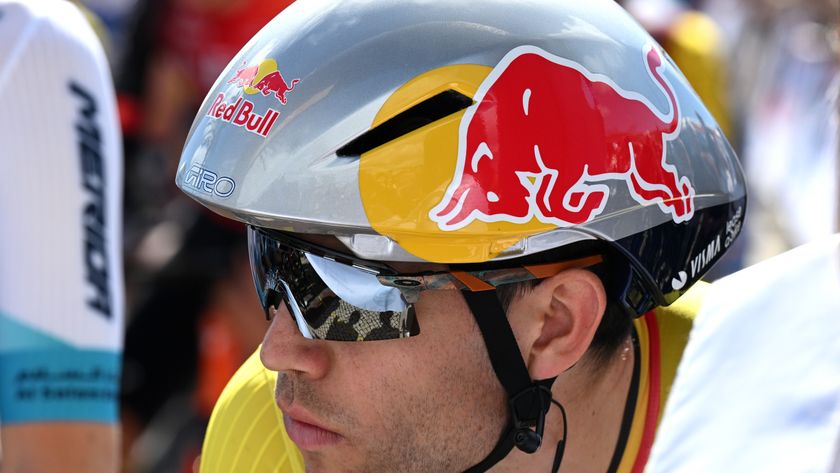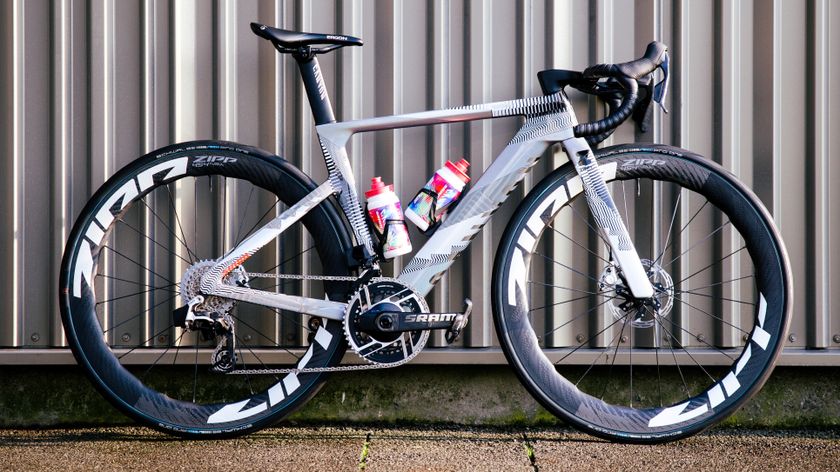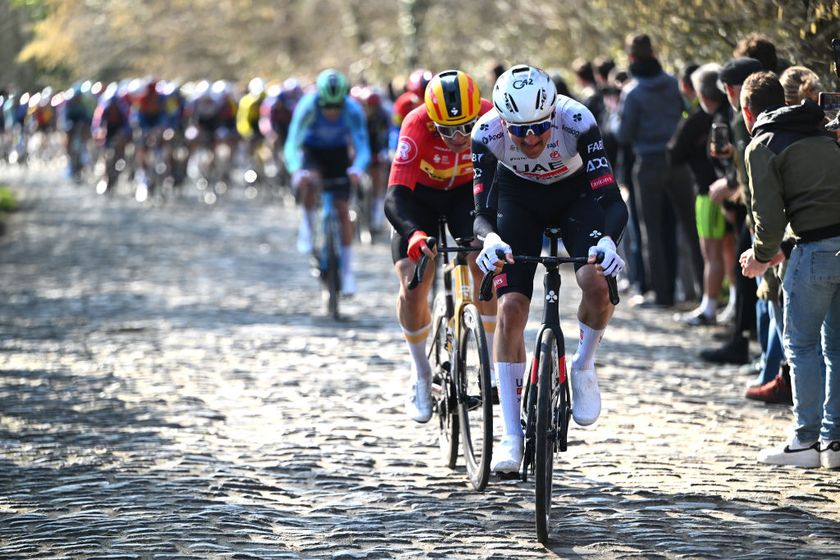Getting a taste of 2010
Accessories and gear from inaugural Press Camp 2009


































New road and off-road wheels from DT Swiss
DT Swiss has expanded its range of pre-built wheels into the midrange with a pair of new '1600' models.
The road-going R 1600 fetches a reasonable US$750 yet still weighs a competitive 1,600g per pair (claimed) without skewers thanks in part to its shallow 23mm-deep aluminum clincher rims. Bladed and butted DT Swiss Aerolite spokes connect to cartridge bearing hubs based on the company's 340 design, which apart from the heavier steel rear axle is a near copy of the higher-end 240s range.
Ratcheting steel-shafted RWS skewers are included as well, and the R 1600 will be available in both Shimano/SRAM 9/10spd and Campagnolo 9/10/11spd versions.
Likewise, the 1,600g per pair (claimed, without skewers) M 1600 is built around 340-based hubs though this time with Center Lock disc rotor compatibility and beefier DT Swiss Supercomp triple butted stainless steel spokes. The sleeved aluminum disc-specific rims' relatively narrow 19mm-width makes them best suited for cross-country or all-mountain applications and the available hub fitments reflect that as well: fronts are available in 9mm quick release, 15mm thru-axle, or 20mm thru-axle (non-convertible) and rears are available in 9mm quick release, 10mm thru-bolt or 12mm thru-axle.
Suggested retail price for the M 1600 is also US$750.
The big news on the road side is the long awaited release of the RRC 1250 carbon clinchers (over a year behind schedule). Shallow all-carbon clincher rims, DT Swiss' top-end 190 Ceramic hubs and bladed Aerolite spokes help bring the total claimed weight down to (you guessed it) 1,250g per pair.
Get The Leadout Newsletter
The latest race content, interviews, features, reviews and expert buying guides, direct to your inbox!
A brief 50km-long test ride revealed little about the overall ride quality of DT Swiss' new flagship road clincher but braking performance was impressively pulse-free and predictable with the included SwissStop Yellow King pads. Suggested retail, however, is a spendy US$3,900.
Just US$30 buys you a new pair of faster-engaging rings (just 10 degrees now instead of 20) for your DT Swiss star ratchet hub though. DT Swiss is still debating which, if any, of its hubs to include the new ratchets in as stock equipment but in the meantime, current hub owners that want a doubly responsive driver can easily drop them in themselves. Roadies probably won't benefit enough to justify the extra friction but these should be a no-brainer for off-road riders that savor technical terrain.
Pending helmets from Lazer
Belgian helmet company Lazer is just about done with its upcoming Tardis time trial and Nirvana off-road designs - both are slated for delivery around September.
The US$175 Tardis sports the usual teardrop shape we've come to expect from aero helmets but Lazer claims several key features make it faster, more comfortable and cooler than usual. The rear and lower sides of the shell use a matte finish and are covered in dimples - both claimed to reduce drag through the creation of a thin and turbulent boundary layer of air immediately adjacent to the helmet - and Lazer's super Rollsys retention system will offer its usual one-handed stepless circumferential adjustments for a hat-like fit.
A trio each of forward-facing and exhaust vents promise to keeping cooling air flowing through but the top of the Tardis is also fitted with a unique cooling port - for water, not air. Simply remove the optional plug (probably best to just leave it at home) and squirt in some refreshing H2O. A network of internal channels and a specially designed X-Static pad then meters out the flow over the rest of your head.
The US$140 Nirvana, on the other hand, is specifically designed with more coverage and lower speeds in mind. The sides and rear come down further to provide more protection and more emphasis is placed on evacuating hot air.
Lazer still fits the Nirvana with a plethora of gaping holes up front though, too, and the X-Static padding is trimmed down over the brow to minimise sweat build-up. Naturally, the Rollsys retention system is included here as well.
Smith Optics Pivlock debuts innovative lens change system
Smith Optics' new PivLock V90 performance shield boasts a remarkably simple pin-and-keyhole method for changing lenses: simply pivot the temples up 45 degrees and off they come.
The frameless design also yields a wide field of view on all sides and Smith Optics' TLT (Tapered Lens Technology) geometry minimises distortion. Both standard and oversized 'Max' shapes will be offered to fit a wide variety of head sizes.
A single-lens PivLock V90 will run you U$119 while a three-lens kit will add just US$20.
Strap up with Saris
Saris claims the sluggish economy has not only pushed consumers away from gas-guzzling SUVs and towards smaller and more efficient vehicles but also away from pricey roof-top bicycle rack systems. According to the Wisconsin company, sales of its more economical hitch- and rear-mounted carriers have noticeably spiked in recent months.
Case in point is the new T-Bones hitch rack (which we showed you at the Sea Otter Classic back in April) and Saris' not-new-but-still-clever Bones RS trunk rack. The Bones RS' surprisingly svelte steel frame hooks on the bottom of a car's trunk and uses just two straps to secure it down while four soft cups mounted in the middle protect paint and glass.
Those two straps are made of rubber-coated steel however - not woven nylon as is more typical - and a clever ratcheting system provides an easier and more consistent means of tightening things down. In addition, the ratchet levers can be locked in place for more security, making the Bones RS one of very few trunk mounted racks that offer at least a modicum of theft prevention.
The folding composite arms carry up to three bikes - all in soft anti-sway cradles - and suggested retail price is a reasonable US$279.
A surprise treat from TRP
TRP isn't even an official exhibitor at the Press Camp event but we still spotted its newest 970SL road brakes on one of Blue Competition Cycles' carbon machines. The forged magnesium dual-pivot arms borrow some design cues from the current R960 what with their skeletonized and heavily machined inner arms while the hollowed-out outer arms are somewhat more conventional looking.
Alloy and titanium hardware help bring the 970SL down to just over 100g per wheel but built-in conveniences such as an integrated quick release and centering adjustment are still on hand.
Most Popular





